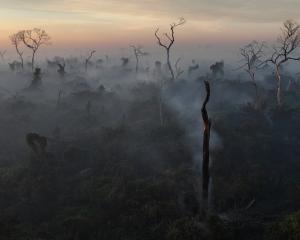"For this region, we're looking at a 2degC increase in the troposphere occurring around 2025-50," Dr Phil Lyver, of Landcare Research, said from Scott Base.
"With those environmental conditions those birds are going to see, we are looking at losing potentially 70% of our Adelie penguin colonies north of 70deg south, and that's basically a 75% loss of the entire population of Adelie penguins in Antarctica."
The temperature increase would cause melting of the sea ice on which both Adelie and emperor penguins depended for foraging for krill and fish.
While this might lead to a drastic decrease in the 10 million-bird Adelie population, it might be a death knell for the emperor penguins, Dr Lyver said.
"There's going to be some real limitations placed on the birds by that whole loss of sea ice, and by what we're seeing on the Antarctic Peninsula region, emperor penguins are facing a similar future," he said.
"Some of the research modelling estimates that they [emperors] may be functionally extinct by the end of the century."
Dr Lyver said the birds would also have to contend with increasing human pressures from fisheries and tourism, and in certain regions, diseases from the influx of other species such as chinstrap and Gentoo penguins.
In order to keep tabs on Adelie population trends, Dr Lyver's team of penguin researchers monitor the birds annually, both on the ground and by a low-flying C-130 Hercules census flight to New Zealand, dubbed "the vomit comet".
Completed every two years since 1981, the flight is used to undertake an aerial census of Adelie breeding pairs in the Ross Sea region, but because of ongoing technical and weather issues, only four sites were photographed when the December flight finally departed.
"We only managed to over-fly four penguin colonies, which represents about 20% of the Victoria Land population," Dr Lyver said.
"Unfortunately, at Wood Bay, west of Cape Washington, we ran into the tail end of the storm that had covered Scott Base in the earlier few days."
Photos from the four sites surveyed were analysed using computer programs, a process that, until recently, involved counting by hand the penguins on enlarged photos.
Unfortunately for penguins and penguin-lovers alike, Dr Lyver said the results did not bode well for a good breeding season.
"The colonies of Franklin Island, Inexpressible Island and Terra Nova appeared to be quite snow covered, which meant the penguins would have struggled to find their nesting sites and stones to build their nests this year at those sites."
Populations dipped in 2000 when a 200km-by-50km iceberg grounded offshore from the Cape Royds colony, preventing access to open water and so depriving the colony of food supplies.
Aside from this, populations have been increasing since the 1990s; but for the penguins of the Ross Sea, only time will tell.











